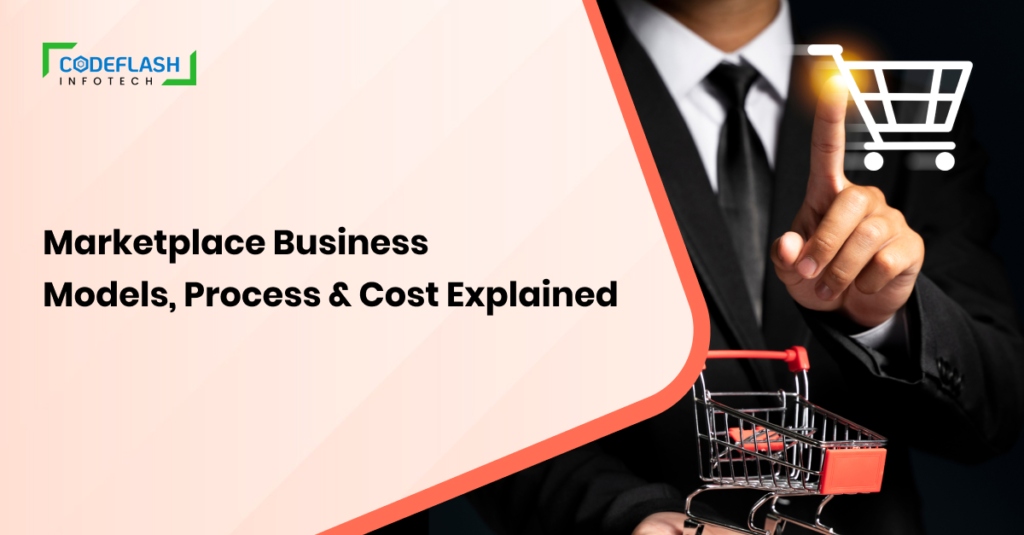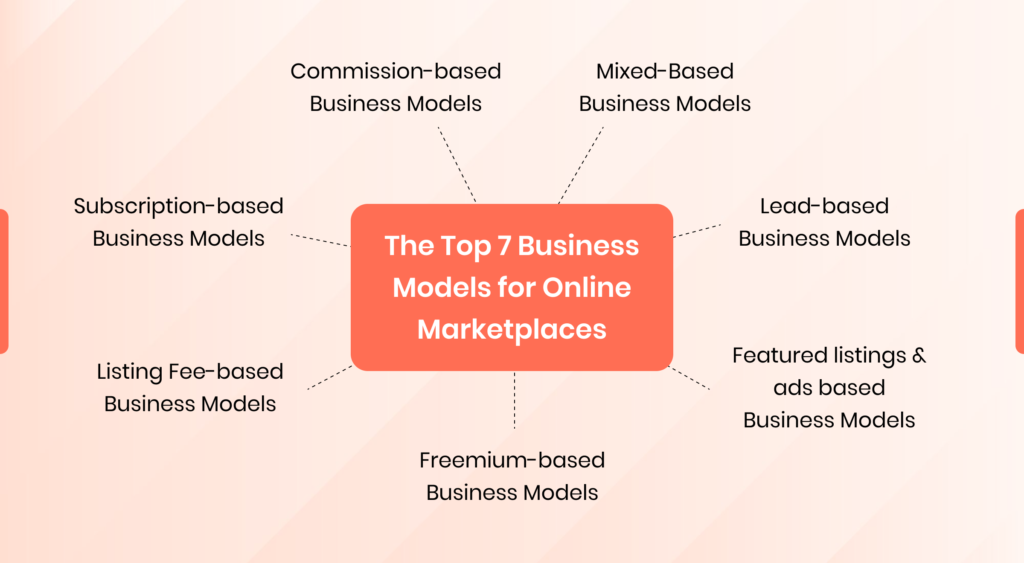
Marketplace Business Models, Process & Cost Explained
26 JULY
Rising revenue, rising traffic, and a never-ending desire for the products listed on your marketplace. It seems unreal. Is it not? That is precisely what the Marketplace Business Models offers you: a chance to expand. One of the best examples of the largest marketplace in the world is Amazon. The tale of Amazon’s growth is likewise the story of the expansion of marketplaces. The online marketplace has experienced enormous expansion, as the data shows. It makes sense that Jeff will soon be a trillionaire. The fortunes of marketplace owners have altered along with the trends in shopping.
What is an Online Marketplace?
Are you searching for a definition of the Marketplace Business Models? An online marketplace is a business strategy that enables consumers and sellers to connect and communicate virtually. It is a creative way to exchange goods and services that benefit both parties by being affordable, convenient, and accessible. Developing a marketplace website allows business owners to market their goods and services without investing in pricey physical infrastructure.
- The Idea
Although the idea of an online marketplace is not new, it has recently acquired popularity due to technological advancements and the growth of e-commerce platforms. A third-party platform manages this platform, which offers a direct connection between buyers and sellers. - Sellers’ Flexibility
When you use an online Marketplace Business Models, you have much control over how things are priced, listed, purchased, sold, and delivered. While consumers can peruse the listings whenever convenient, sellers can offer their goods on the platform for little or no fees or commissions. - Charge Schedules
A successful B2B or B2C marketplace’s listing fee structure is crucial. This charge assists in defraying some of the platform’s operating expenses, including hosting, payment processing, customer support, etc. Although the price structure differs from marketplace to marketplace, it often uses a flat charge or a percentage-based model based on the seller’s listing count.

Marketplaces Business Models: The Top 7 for Online Marketplaces in 2024
Amazon’s successful market strategy is largely driven by its profit-making approach. Typically, online marketplaces rely on three main tactics: listing fees, commissions, and subscriptions. However, there are numerous other revenue models, each with its own benefits and challenges. These models vary in their characteristics, scalability, and profitability in today’s market. In 2021, the top 100 online marketplaces saw a global expenditure of $3.23 trillion.
- Commission-based Marketplaces Business Models
Companies earn fees by connecting buyers and sellers, typically charging a percentage of the transaction value.
– High revenue from successful transactions.
– Aligns interests of seller and platform owner.
– Requires lots of sales.
– May discourage transactions due to increased costs. - Subscription-based Marketplaces Business Models
Customers pay a recurring fee to gain access to a product or service.
– Steady income for the business.
– Helps build a loyal customer base.
– Some users may avoid due to regular payments.
– Needs to offer exciting or new content to keep customers. - Listing Fee-Marketplaces Business Models
Platform owners charge money to allow products or services to be listed.
– Can earn money quickly.
– May attract better listings because of the listing fee.
– The extra cost can lessen the number of listings.
– Too high fees can limit growth. - Freemium-based Marketplaces Business Models
Basic services are free, but users must pay for extra features or better service.
– Can draw many users with free services.
– Users can try before paying.
– It can be hard to get free users to pay later.
– Faces competition from other free or cheaper services. - Featured listings and ads based Marketplace Business Models
Companies pay to make their ads or listings more noticeable.
– Can make more money from businesses wanting more visibility.
– It can help users find what they want more quickly.
– It may make the website or app too busy or hard to use.
– Bigger companies with more money might dominate. - Lead-based Marketplace Business Models
Companies pay a fee to obtain the contact details of potential customers from another business. They pay only for the leads they get.
– A good way to make money from the current user base.
– Not all leads may be good, which can upset customers.
– Can put off customers if they feel their details are being sold. - Mixed-Based Marketplace Business Models
This model uses different ways from various Marketplace Business Models to make money.
– Can make money in many ways, appealing to different people.
– Not depending on only one way to make money reduces risk.
– It can be hard to manage different methods at once.
– Might confuse customers with too many offerings.
Must Have Features on your Online Marketplace App
- Easy Registration Procedure
Make the vendor and consumer sign-up procedure as simple as possible so they can finish the procedure in the least amount of time. These days, people have too many options and are too busy. If your enrollment process is too complicated or takes too long, users can give up on your site and quickly flip the tab. Therefore, ensure the onboarding and registration processes are simple, short, and straightforward. Request data and allow users to register using social media sites like Facebook, Google, Twitter, etc. Permit people to reclaim their name and password. - Advanced Supplier Information
The vendors are the primary participants in your multi-seller marketplace. You can expand more quickly, and the more sellers you can attract to your website. A large number of sellers suggests that your website offers a variety of goods. Thus, you should offer them adequate space on your website so they can sell their goods. - Simple Navigation & Custom Search
In an online marketplace, users can choose from various products. The products should be arranged into distinct categories so customers can locate the segment they need and quickly obtain the appropriate goods. You can add a sophisticated search function to your website as the owner. As a result, customers may look up their products right there. However, make the procedure easy to follow, long, and straightforward. - The Platform’s Mobile-Friendliness for Your Online Marketplace
Your website must support all screen sizes. Customers using various portable devices must be able to view the exact view and quickly browse the website. If not, they’ll go elsewhere. Additionally, a mobile-friendly website will improve the user experience for your clients. It portrays you as a trustworthy supplier of information, products, and services. Thus, vendors will be more inclined to add their goods to your website. In addition to providing their clients with superior service, they may run their internet store from their cell phones. - Every Well-Known Payment Gateway
Users should be able to choose from various payment options on your marketplace. Additionally, select online payment providers with global coverage and compatibility with eCommerce platforms. You might be able to integrate bank transfers, Stripe, and Paypal with your online store or alternative nearby payment options determined by how easily your customers may reach you so that users can select the goods they want and pay right there on the website. It makes the customer’s life easier. Additionally, users can easily transact or shop on your website. It takes a lot of time and is easy to use. Prior to configuring the payment gateways, you should also consider the vendor’s preferences. - In-Dependent Analytics Display
Advanced analytics and reports benefit both administrators and vendors. They provide a detailed picture of consumer behavior, session duration, cart abandonment causes, and other information. These statistics may enhance your website’s performance and marketing approach. - Simple Process for Downloading and Making Reservations
After making a purchase, customers should be able to download any digital goods your marketplace offers. Alternatively, if you’re starting a website similar to Airbnb, you need to have a booking mechanism on your eCommerce site. It implies that, depending on your website type, you might provide your consumers with some fantastic features. If not, your website might catch your target audience’s attention less than you would like. - Reviews and Ratings for the Platform of Your Online Marketplace
The review area is one of an online marketplace platform’s most potent features. User reviews have been shown to influence sales and are a crucial factor in decision-making. Most people look at ratings and reviews before placing an online order. This could be for necessary services, meals from a restaurant, or merchandise from an internet retailer. Additionally, it would help if you permitted users to leave reviews or evaluations for any supplier or item on your website. It facilitates the development of visitor response and trust for your multi-seller eCommerce website. Additionally, genuine user evaluations encourage prospective buyers to finish their transactions on your website. It’s a powerful strategy for strengthening your bonds with clients. - Choices for Simple Social Media Posting
Social networking is becoming an increasingly popular tool for business promotion on a global scale. You could incorporate social media buttons into your marketplace with many vendors. Visitors can, therefore, effortlessly share your website and their thoughts on various social media sites. This will raise the value of your brand. The more brand talk there is, the quicker you can expand internationally. Depending on your target audience, you can add well-known social media sites like Facebook, Instagram, Reddit, LinkedIn, and others. - Making Certain Secure Transactions
You must ensure that your online marketplace is adequately protected. This is essential for both customers and suppliers. First, take care of your eCommerce site’s SSL certificate. It ensures that a secure connection exists between the browser and the server. After that, attend to the remaining factors. Furthermore, it protects the confidentiality of all customer information. Customers trade a lot of private information on your website while transacting.
Conclusion
Whether an online marketplace is B2B, C2C, or B2C, this Marketplace Business Models offers significant advantages. It provides a straightforward means of facilitating transactions between buyers and sellers without compromising security or customer support. As new technologies emerge, these platforms will become more advanced, offering improved value propositions for both buyers and sellers. When developing a marketplace app, businesses can consider implementing this income model to stay ahead of the competition and increase earnings. Additionally, understanding the cost to develop an online marketplace website is crucial for planning and budgeting effectively.





